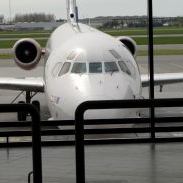 The International Air Transport Association (IATA) reports that 2008 yielded more losses for airlines than originally forecast, and that 2009 will likely be worse than was projected earlier.
The International Air Transport Association (IATA) reports that 2008 yielded more losses for airlines than originally forecast, and that 2009 will likely be worse than was projected earlier.
How much worse things can get for the airline industry is still a matter of debate, but even recent fee hikes look unlikely to offset the losses.
So just how bad will it get for airlines?
As recently as June, IATA, the global trade organization which represents about 230 international airlines, had expected airlines to lose $9 billion in 2009. Now, due to weak yields and rising fuel prices, the organization projects losses of $11 billion.
Related stories:
IATA also increased its loss estimates for 2008 from $10.4 billion to $16.8 billion. With this correction, the years 2008 and 2009 will go down as the worst two-year period in airline industry’s history.
“This is not a short-term shock,” said Giovanni Bisignani, IATA’s Director General and CEO in a public statement on Tuesday. “US$80 billion will disappear from the industry’s top line. That 15 percent of lost revenue will take years to recover.”
 Prior to 2008-09, the industry’s worst period was in 2001 and 2002, after the September 11, 2001, terrorist attacks drove down demand. Losses totaled $24.3 billion in 2001-2002, and it took the industry three and a half years to recover.
Prior to 2008-09, the industry’s worst period was in 2001 and 2002, after the September 11, 2001, terrorist attacks drove down demand. Losses totaled $24.3 billion in 2001-2002, and it took the industry three and a half years to recover.
“The sharp decline in yields will leave a lasting mark on the industry’s structure. And revenues are not likely to return to 2008 levels until 2012 at the earliest,” said Bisignani.
According to IATA, North American carriers are expected to post losses of $2.6 billion, more than double the previous estimate of $1 billion. European carriers are expected to post the largest losses with about US$3.8 billion, followed by Asia-Pacific carriers which are expected to post losses of about US$3.6 billion.
The decline in business travel had a significant effect on yields. The demand for business class seats near the front of the plane, which are most profitable and frequently booked last minute, has dropped 20 percent, compared with a 5 percent drop in coach.
IATA projected more losses in 2010, but at levels that might indicate a turnaround.
The organization projects a $3.8 billion net loss based on a “limited revival of growth” in traffic volume of 3.2 percent for passengers and 5 percent for cargo; a small increase in yields of 1.1 percent for passengers and 0.9 percent for cargo; and oil at $72 per barrel.
Bisignani said airlines aren’t asking for government bailouts, but he did call upon airports to take action by cutting fees. He lauded Singapore and Malaysia for their recent cuts to operational charges, but expressed concern that JFK and Newark Liberty airports may soon rank amongst the most expensive in the world.
By Dan Bence for PeterGreenberg.com.
Related Links: IATA.org, USA Today, Professional Travel Guide, MSNBC












